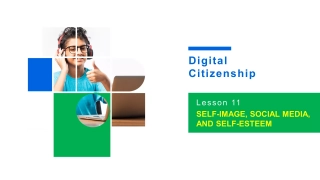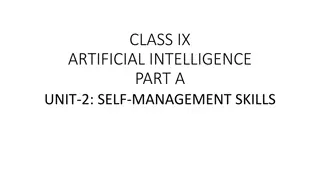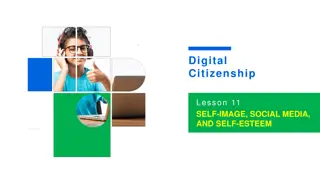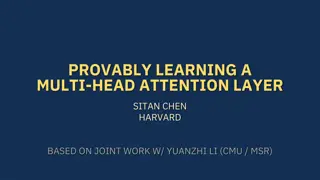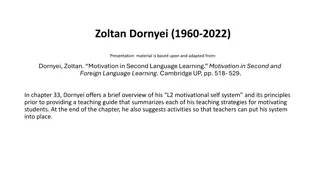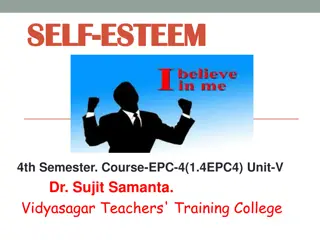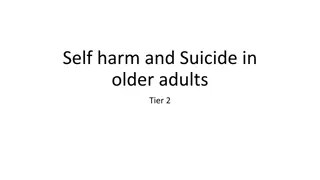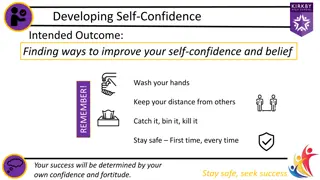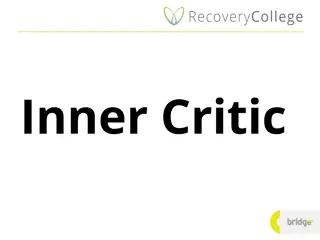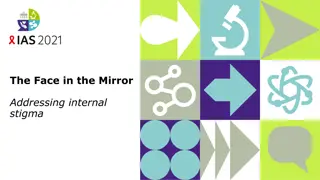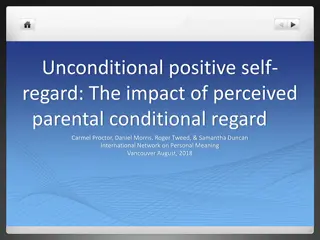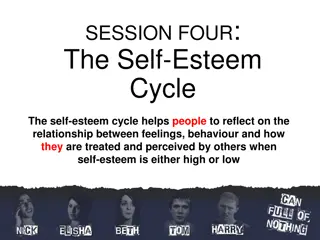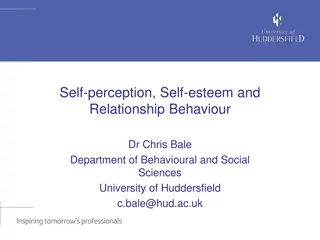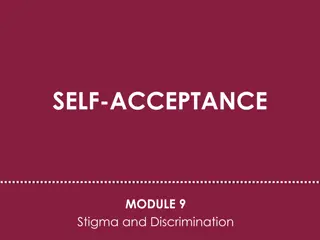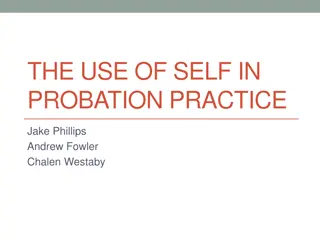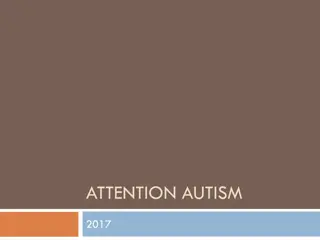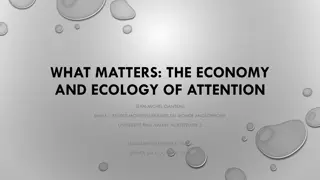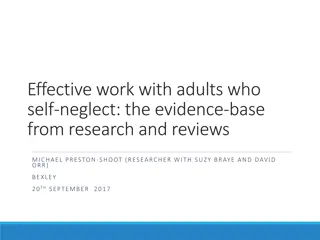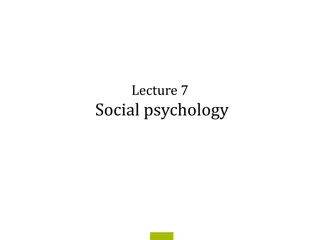Digital Citizenship: Self-Image, Social Media, and Self-Esteem
Explore the impact of social media on self-image and self-esteem. Learn about the influence of filters and media on body perception. Reflect on self-assessment and take-home activities to improve self-confidence.
3 views • 11 slides
Enhancing Self-Management Skills for Personal Growth
Self-management skills are essential for regulating emotions, thoughts, and behaviors effectively. Understanding yourself, setting goals, and developing positive habits contribute to self-improvement. Positive results of self-management include proactivity, goal setting, and self-reinforcement. Stre
1 views • 9 slides
Why Starting with Cinema is Crucial for a Successful New Product Launch
Launching a new product in today's media landscape can be challenging, with fragmented audiences and intense competition for attention. Starting with cinema in your audiovisual mix can be highly effective in maximizing reach, attention, and trust for your brand. Cinema offers unparalleled levels of
2 views • 11 slides
Understanding Self-Worth in Children: Building a Strong Foundation
Explore the importance of self-concept, self-esteem, and self-worth in children's development. Learn how parents can positively impact a child's self-perception and self-value through nurturing experiences. Discover the key sources influencing children's self-worth and the critical role of early lif
0 views • 30 slides
Understanding the Impact of Social Media on Self-Image and Self-Esteem
Explore the story of Tara, a 13-year-old girl whose experience with social media shapes her self-image and self-esteem. Delve into how social media can influence our perceptions of ourselves and others, affecting mental well-being and relationships. Understand the role of digital citizenship in navi
10 views • 11 slides
Self-Advocacy, Communication, and Research
Explore the essence of self-advocacy, communication, and research in this training module. Learn to articulate your needs effectively, acquire self-advocacy skills, and identify various settings where self-advocacy is crucial. Engage in activities to assess your self-advocacy skills and reflect on h
2 views • 35 slides
Understanding Multi-Head Attention Layers in Transformers
Sitan Chen from Harvard presents joint work with Yuanzhi Li exploring the provable learnability of a multi-head attention layer in transformers. The talk delves into the architecture of transformers, highlighting the gap between practical success and theoretical understanding. Preliminaries, prior w
3 views • 38 slides
Enhancing Language Learning Motivation: Insights from Zoltan Dornyei's L2 Motivational Self System
Zoltan Dornyei's L2 Motivational Self System emphasizes the dynamic interplay of motivation, cognitive, and emotional factors in language learning. By addressing students' ideal self, ought-to self, and learning environment, this approach facilitates creating, generating, maintaining, and encouragin
0 views • 13 slides
Understanding Self-Esteem: Meaning, Importance, and Types
Self-esteem is how we perceive our worth and value. High self-esteem leads to confidence and positivity, while low self-esteem can result in self-doubt and negative emotions. Self-esteem impacts mental health, behavior, decisions, relationships, and overall success in life. Recognizing and nurturing
2 views • 15 slides
Understanding Self-Esteem and Ways to Improve It
Self-esteem is our perception of ourselves, impacting how we navigate life. Healthy self-esteem fosters positivity, while low self-esteem can be detrimental. Various factors, like childhood experiences, contribute to low self-esteem, but steps can be taken to improve it. Building positive relationsh
0 views • 14 slides
Understanding the Self: Psychology's Focus and Implications
The field of psychology has long been intrigued by the concept of self, exploring its importance to well-being, self-esteem, and brain localization. Research reveals how excessive optimism, self-bias, and blindness to incompetence can impact self-esteem. Contrasting individualist and collectivist cu
1 views • 41 slides
Understanding Self-Harm and Suicide in Older Adults
Self-harm and suicide in older adults are serious issues that require attention due to the associated risks. The incidence of self-harm in adults aged 65 years and older is notable, with factors such as physical health conditions, pain, and psychiatric history contributing to the risk. Staff should
0 views • 23 slides
Building Self-Confidence: Key Steps and Benefits
Understanding self-confidence, its importance, and how to develop it can lead to enhanced resilience, motivation, reduced fear and anxiety, and a stronger sense of self. Self-confidence allows for confident behavior, while lack of it can lead to self-doubt and avoidance of risks. Learning to embrace
0 views • 7 slides
The Importance of Self-Awareness in Personal Growth
Self-awareness is crucial for understanding one's character, feelings, and motivations. It helps in recognizing strengths and weaknesses, managing stress, improving communication, and fostering empathy. Developing self-awareness involves introspection, mindfulness, self-reflection, and seeking feedb
2 views • 47 slides
Understanding Your Inner Critic and Building Self-Compassion
Explore the concept of the Inner Critic, its impact on self-perception, and practical strategies to develop self-compassion. Learn to identify critical self-talk, differentiate between the inner critic and your true self, and cultivate a positive internal dialogue to counter negativity effectively.
0 views • 9 slides
Understanding Self-Neglect in Adults: Risk Management and Complex Factors
Self-neglect involves neglecting personal care and surroundings, posing risks to health and well-being. Legislation and guidance provide frameworks to address self-neglect, which can manifest in various forms such as lack of self-care and refusal of services. Professionals must consider the complex
0 views • 23 slides
Developing a Self-Care Action Plan for Overall Well-Being
Self-care involves deliberate activities to nurture mental, emotional, physical, and spiritual health, yet it is often neglected. This guide explores the essence of self-care, emphasizes the importance of building a personalized self-care action plan, and provides insights into taking care of your b
0 views • 19 slides
Pan-Hampshire & Isle of Wight Self-Harm Pathway for Non-Health Professionals
This pathway provides guidance for children under 18 presenting with self-harm behaviors, including definitions, risk scenarios, suggested responses, and further considerations for urgent medical and psychological support in self-harm cases. It covers various types of self-harm, levels of risk, and
0 views • 5 slides
Understanding Attention and Concentration: Key Aspects and Determinants
Attention is our ability to focus on specific stimuli while disregarding distractions. It can be categorized into focused, sustained, divided, and alternating attention. External and internal factors influence our attention levels. The nature of stimuli plays a crucial role in capturing attention ef
0 views • 19 slides
Understanding Self-Stigma in HIV: Causes and Impacts
Self-stigma in the context of HIV involves negative beliefs, thoughts, and behaviors that can lead to shame, guilt, and self-rejection. This article explores the cycle of self-stigma, differences between stigma and discrimination, causes of self-stigma, and its impact on individuals. Addressing inte
0 views • 12 slides
Impact of Parental Conditional Regard on Self-Regard Development
The impact of parental conditional regard (PCR) on self-regard development is significant, affecting authenticity and the ability to form a true self. PCR involves parents showing affection and appreciation based on the child's adherence to specific expectations, leading to negative psychological ou
0 views • 13 slides
Enhancing Self-Confidence for Professional Success
Understanding the importance of self-confidence in the workplace is crucial for personal growth and career advancement. Self-confident individuals trust their abilities, maintain a sense of control over their lives, and have realistic expectations. This summary delves into the characteristics of sel
0 views • 13 slides
Understanding the Self-Esteem Cycle: High vs Low Self-Esteem
The self-esteem cycle explores the interplay between one's feelings, behavior, and how they are treated based on their self-esteem level. High self-esteem is associated with positive feelings, supportive behavior, and positive interactions, while low self-esteem manifests in negative emotions, withd
9 views • 4 slides
Enhancing Self-Regulation for Formative Assessment through Social and Emotional Learning
Explore the significance of self-regulation in formative assessment, understand key concepts like self-control, emotional competence, and perseverance. Discover actionable strategies to implement self-regulation interventions with students and train other adults effectively. Future orientation and s
0 views • 25 slides
Understanding Mindful Self-Judgment and Its Role in Mental Health
Mindful self-judgment is a complex concept that involves balancing self-awareness and self-compassion. While nonjudgment is a key aspect of mindfulness practices, there is a debate on whether mindful self-judgment can be appropriate and functional in certain circumstances. Researchers like June Pric
2 views • 46 slides
Understanding Self-Esteem: Highs and Lows
Self-esteem is the judgment we hold about ourselves, shaped by experiences and relationships. High self-esteem individuals embrace new encounters with confidence and positivity, while low self-esteem individuals struggle with self-doubt and criticism. Recognizing signs of low self-esteem is crucial
0 views • 11 slides
Enhancing Self-Regulation Skills in Children: Strategies and Tips
Understanding and fostering self-regulation in children is crucial for their development. Self-regulation involves controlling impulses, focusing, and shifting between tasks. This article delves into the internal mechanisms of self-regulation, such as executive function, and provides practical tips
1 views • 22 slides
Hierarchical Attention Transfer Network for Cross-domain Sentiment Classification
A study conducted by Zheng Li, Ying Wei, Yu Zhang, and Qiang Yang from the Hong Kong University of Science and Technology on utilizing a Hierarchical Attention Transfer Network for Cross-domain Sentiment Classification. The research focuses on sentiment classification testing data of books, training
0 views • 28 slides
Psychology Review Questions on Attention and Perception
Explore ungraded review questions on topics like the Stroop effect, visual attention, eye movement tracking, feature integration theory, and more. Test your knowledge and understanding of concepts related to attention and perception in psychology. Use visual aids and prompts to demonstrate your answ
0 views • 8 slides
Boosting Your Child's Self-Esteem & Confidence in Parenting Workshop Series
Understanding self-esteem in children is crucial for their emotional development. Healthy self-esteem leads to positive behaviors, while low self-esteem can result in negative self-perceptions. Recognizing signs of healthy and unhealthy self-esteem allows parents to support and nurture their child's
0 views • 11 slides
Enhancing Self-Efficacy and Self-Determination in the Workplace
Establishing high levels of self-efficacy and self-determination in the workplace is crucial for accomplishing tasks and goals effectively. This publication explores the significance of these traits, providing strategies for managers to foster and maintain them. Discover why self-efficacy and self-d
0 views • 8 slides
Understanding Self-Perception, Self-Esteem, and Relationship Behavior
The discussion explores the impact of low self-esteem on various psychological issues, societal views on self-worth, self-perception biases, and the consequences of self-esteem in different aspects of life, backed by research and theories such as the Better-Than-Average Effect and Sociometer Theory.
0 views • 19 slides
Understanding Self-Acceptance and Overcoming Stigma
Self-esteem and self-acceptance are distinct concepts, with self-acceptance focusing on embracing all facets of oneself unconditionally. Developing self-acceptance involves stages like aversion, curiosity, tolerance, and allowing. Overcoming avoidance and resistance can lead to self-compassion and g
0 views • 10 slides
The Use of Self in Probation Practice: Understanding Self-Disclosure and Its Implications
Explore the concept of self-disclosure in probation practice, examining different methods, findings, and implications. Discover the two schools of thought regarding self-disclosure and delve into the various realms and subtypes of self-disclosure practices. Gain insights into the forms of self-discl
0 views • 25 slides
Understanding Attention Autism: A Creative Approach for Building Communication Skills
Attention Autism is a highly engaging method for developing attention and early communication skills, beneficial for all children. It involves motivating activities, shared experiences, and clear communication. The approach consists of stages such as focusing attention, sustaining attention, shiftin
0 views • 8 slides
Understanding Leadership and Self-Leadership for Personal Development
Leadership is defined as an influence relationship between leaders and followers striving for real change. It involves self-awareness, self-management, and self-development. Self-leadership begins with understanding oneself, motives, and capabilities through self-awareness, ultimately leading to pur
0 views • 42 slides
The Economy and Ecology of Attention in the Digital Age
The text explores the concept of attention economy, emphasizing the scarcity of human attention in the information age. It delves into how attention has become a valuable commodity, driving global corporations to maximize engagement. Discussions cover distraction economics, the role of technology in
0 views • 13 slides
Understanding Self-Neglect in Adults: Challenges and Research Insights
This content delves into the complex issue of self-neglect in adults, covering its definition, key challenges, and the research evidence available. It explores the various aspects of self-neglect, including neglect of self-care, domestic environment, and refusal of services. The challenges associate
0 views • 39 slides
Understanding the Self in Social Psychology
Delve into the concept of the individual and the self in social psychology, exploring how identities have evolved historically and the distinction between collective and individual selves. Learn about self-awareness, Wundt's differentiation of I and me, and Higgins' self-discrepancy theory, shedding
0 views • 84 slides
Multimodal Recurrent Attention CNN for Image Aesthetic Prediction
Using a multimodal recurrent attention neural network, MRACNN, this study proposes a unified approach for image aesthetic prediction by jointly learning visual and textual features. Inspired by human attention mechanisms, the network utilizes datasets like AVA and photo.net comments to enhance multi
0 views • 14 slides
